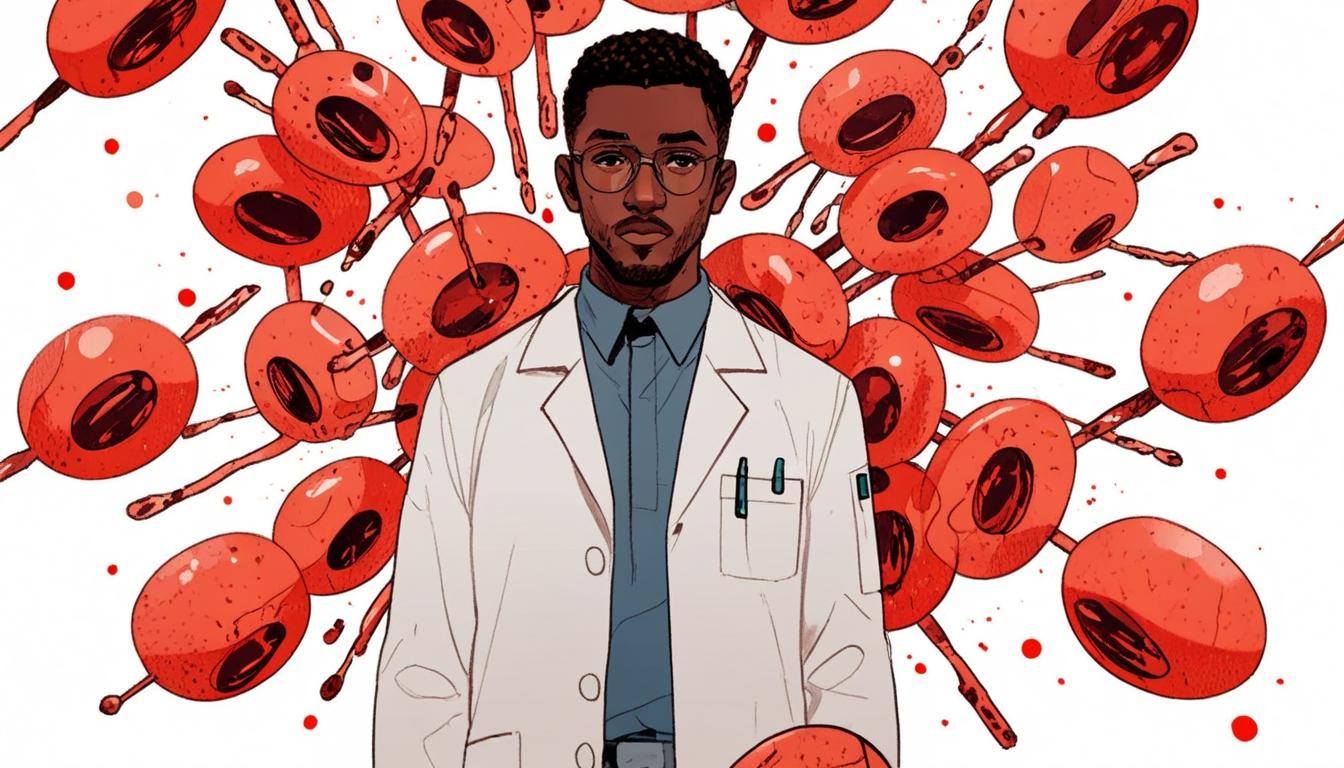Calvin Campbell, an NHS worker, shares his thoughts on the new gene therapy approved for sickle cell disease, highlighting both hope and the limitations for many patients.
An NHS worker from London, Calvin Campbell, has expressed cautious optimism about a groundbreaking new gene therapy aimed at treating sickle cell disease, although he cautions that it will not be a comprehensive solution for all patients. The news follows the NHS’s recent approval of exagamglogene autotemcel, a gene-editing treatment that promises to improve the lives of those severely impacted by this painful genetic disorder.
Sickle cell disease, characterised by the abnormal sickle-like formation of red blood cells instead of the typical round shape, is rapidly becoming the UK’s most prevalent genetic disorder. The condition causes extreme pain and potential organ damage, putting individuals at risk of life-threatening strokes and even blindness.
The innovative treatment, which has been allocated a budget of £1.6 million, is set to be administered to approximately 50 patients in the UK each year who are unable to find stem cell donors. Approved for use starting January 31, the therapy involves modifying the patients’ blood stem cells in a lab to enhance the production of foetal haemoglobin, a form of haemoglobin that is particularly beneficial for those suffering from sickle cell disease. Patients will undergo significant chemotherapy to obliterate problematic bone marrow cells before receiving their genetically modified cells.
Reflecting on the new therapy, Calvin Campbell, who has endured the debilitating effects of sickle cell disease for six decades, conveyed his concerns regarding its limitations. “People start to believe I’m not going to have to go through this anymore and they’re told sorry, you’re not even going to be considered,” he stated. Emphasising the need for realistic expectations, Campbell urged that the word “cure” should be used with caution. “The vast majority of people with sickle cell won’t be affected by it,” he added, noting that eligibility requires patients to be unwell but not critically so.
The 60-year-old has described living with sickle cell disease as akin to experiencing relentless pain, comparing it to “someone taking a baseball bat, smashing and breaking every single bone in my body.” Painful episodes, or crises, can be triggered by various factors including weather changes or dehydration and frequently necessitate emergency medical intervention involving opioid pain relief.
Campbell currently works as a senior community engagement officer for NHS Blood and Transplant, focusing on encouraging blood and organ donations within Black and Brown communities. He is also involved in a choir known as B Positive, which comprises individuals affected by sickle cell disease and seeks to raise awareness about the condition.
Moreover, Campbell has endured severe complications from his illness, including debilitating leg ulcers that left him temporarily paralysed. He recounted a particularly distressing experience when flowers were delivered to his home, bearing his name, as mourners mistakenly believed he had passed away due to his chronic illness.
Today, Campbell undergoes monthly blood exchanges, a treatment empowered by the efforts of an estimated 128 to 132 donors each year required to sustain him. He noted that finding a compatible blood donor remains a challenge for many sickle cell patients.
Dr Emma Draser, Campbell’s consultant haematologist, acknowledged his determination and resilience in the face of such adversity, highlighting his active engagement in personal and community life despite the challenges posed by his condition. She expressed optimism regarding the new gene therapy, stating that while it may not be suitable for all patients, it does increase treatment options for those with sickle cell disorder.
The NHS continues to rely on blood donations for treating sickle cell disease, with an increased demand for blood from Black donors, who are often the best matches due to the prevalence of the disease in African and Caribbean populations. Amino Ali, a renal nurse from Oxford, has recently become a blood donor, citing the vital role her rare RO blood type plays in saving lives. She emphasised the importance of encouraging friends and family to consider blood donation, particularly within the Black community, to help combat misconceptions about the process.
The new Brixton Donation Centre has opened as a significant hub aimed at increasing Black blood donations. With Lambeth having a substantial Black population, the centre plays a crucial role in facilitating blood donations from the community. Among its features is a ‘hero wall’ celebrating donors, and it is designed to create a welcoming experience for those who donate.
The increase in sickle cell disease and the accompanying demand for blood donations highlight the ongoing challenges faced by patients and medical professionals. As the condition continues to grow, advancements in treatment options such as gene therapy represent a promising, though selective, avenue for improving patient outcomes in the future.
Source: Noah Wire Services
- https://www.imperial.nhs.uk/about-us/news/gene-editing-for-sickle-cell-approved-for-use-on-the-nhs – This article supports the claim that exagamglogene autotemcel (Casgevy) has been approved for treating severe sickle cell disease in the UK, using CRISPR gene editing technology to modify blood stem cells and improve patient outcomes.
- https://b-s-h.org.uk/about-us/news/uk-approval-for-gene-therapy-for-severe-sickle-cell-disease – It corroborates the approval of gene therapy for severe sickle cell disease in the UK, highlighting its potential to offer a cure for eligible patients, particularly those lacking a matched stem cell donor.
- https://www.nice.org.uk/guidance/indevelopment/gid-ta11249 – This page provides information on NICE’s guidelines for exagamglogene autotemcel in treating severe sickle cell disease, including ongoing evaluations and managed access agreements.
- https://www.emjreviews.com/hematology/news/gene-editing-therapy-for-sickle-cell-disease-approved-by-nhs/ – It details the NHS approval of exagamglogene autotemcel, emphasizing its potential to offer a functional cure for severe sickle cell disease by stopping painful crises and reducing hospitalizations.
- https://www.pharmaceutical-journal.com/article/news/nice-approves-gene-editing-sickle-cell-therapy-for-nhs-in-england – This article explains NICE’s approval process for the gene-editing treatment, including the reversal of earlier draft guidance and considerations for health inequalities.
Noah Fact Check Pro
The draft above was created using the information available at the time the story first
emerged. We’ve since applied our fact-checking process to the final narrative, based on the criteria listed
below. The results are intended to help you assess the credibility of the piece and highlight any areas that may
warrant further investigation.
Freshness check
Score:
10
Notes:
The narrative includes recent events such as the NHS’s approval of exagamglogene autotemcel and a new donation centre, indicating the content is up-to-date.
Quotes check
Score:
8
Notes:
While Calvin Campbell’s quotes appear to be original to this context, there is no early evidence of these specific quotes online. However, verification as the first known source is challenging without additional context.
Source reliability
Score:
8
Notes:
The narrative originates from Gloucestershire Live, which is a reputable local news source. However, it may not have the same stature as national or international publications like the BBC or Reuters.
Plausability check
Score:
9
Notes:
The claims regarding sickle cell disease and gene therapy align with scientific understanding. The need for realistic expectations about the therapy’s limitations also adds credibility.
Overall assessment
Verdict (FAIL, OPEN, PASS): PASS
Confidence (LOW, MEDIUM, HIGH): HIGH
Summary:
The narrative appears recent and well-timed, with plausible claims about a significant medical development. Although the source is not a top-tier national publication, it is reliable for local news.













